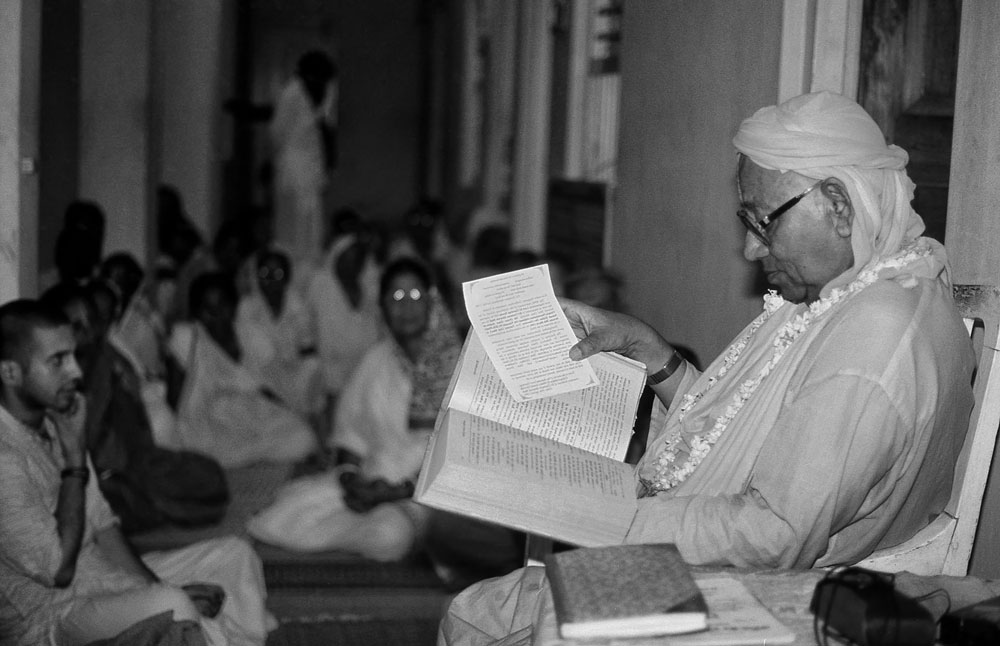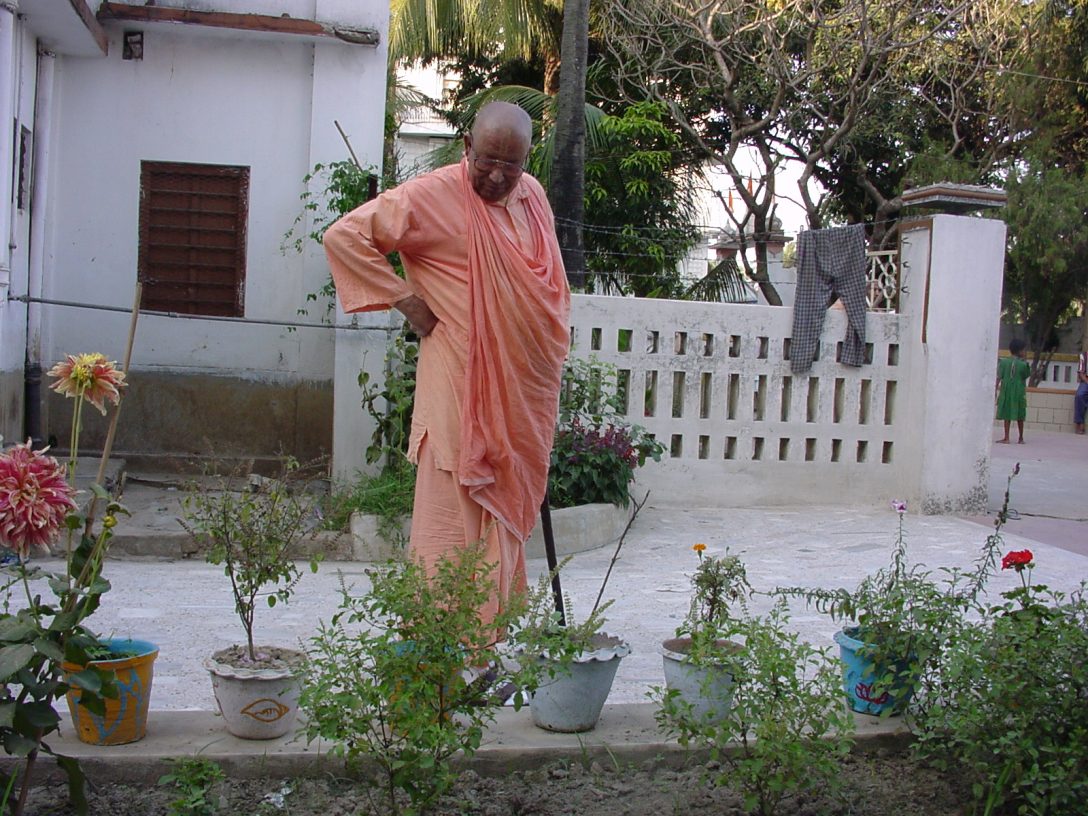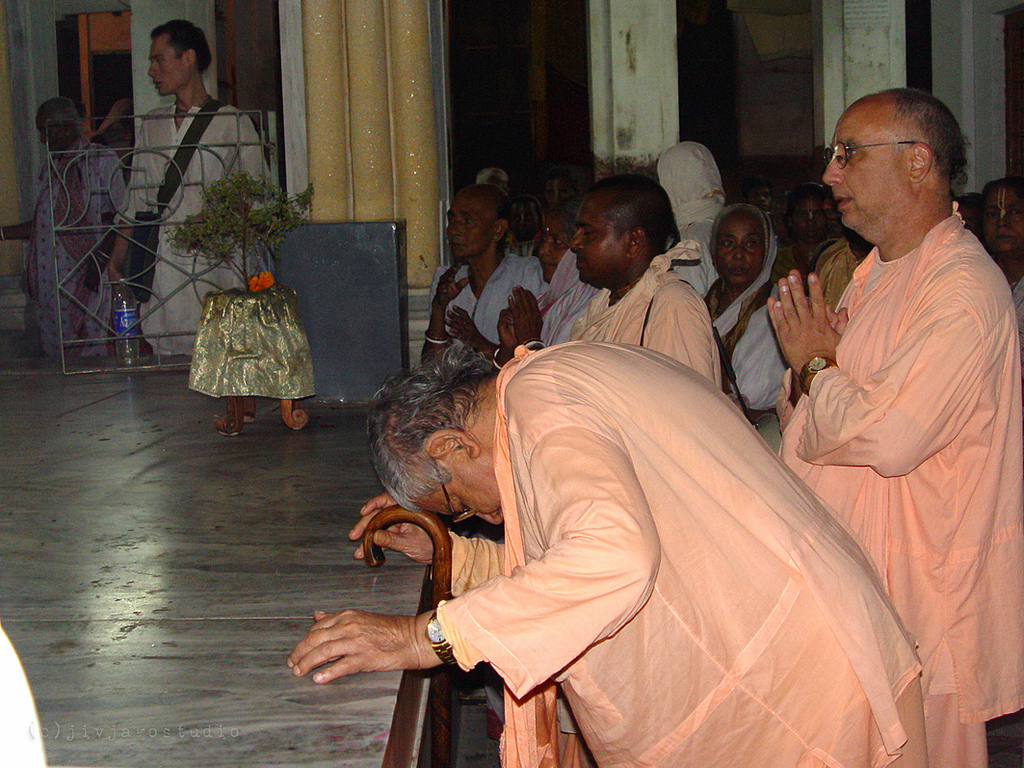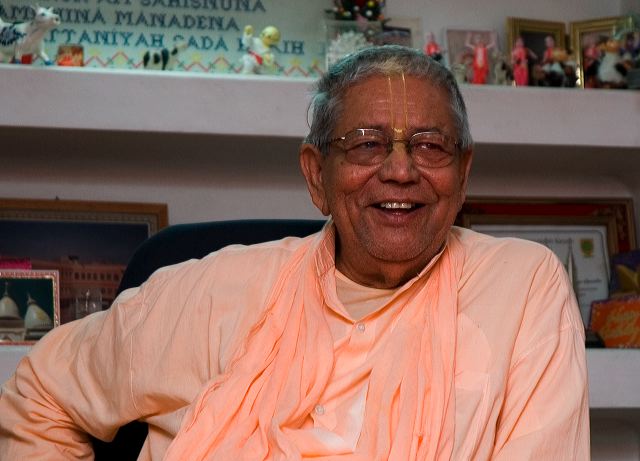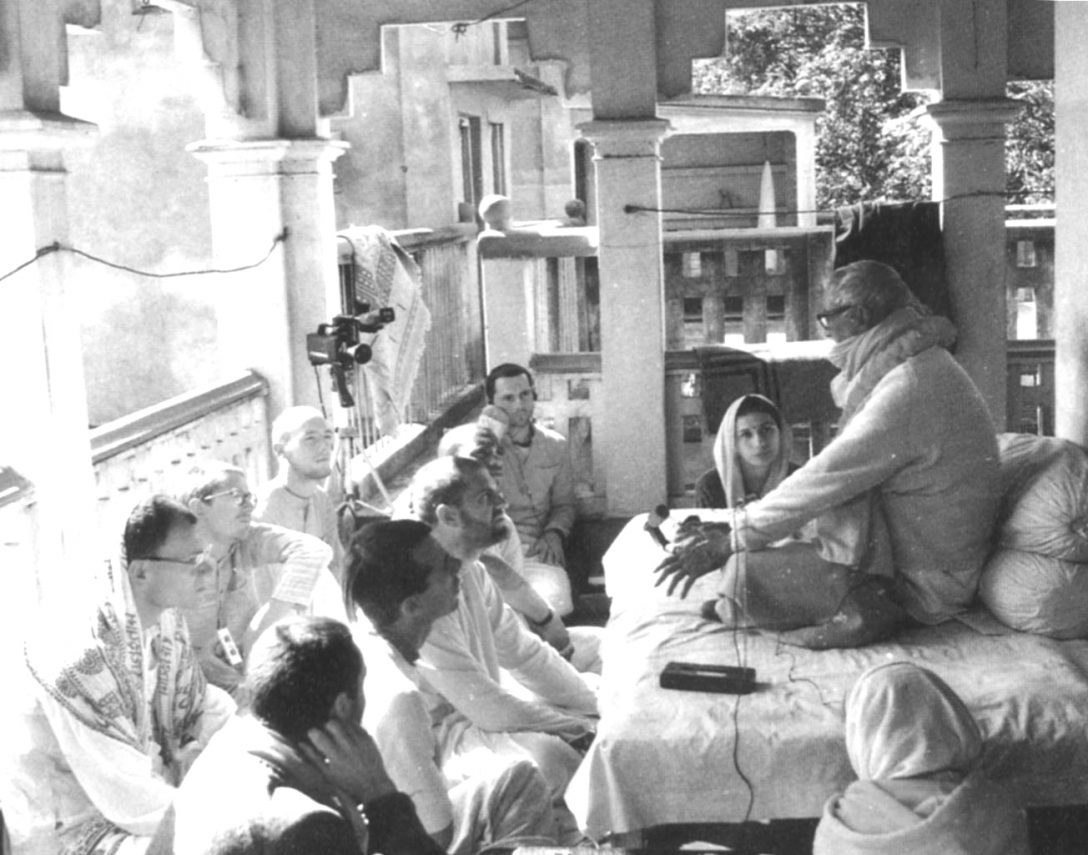Srila Govinda Maharaj reading chapter one of Sri Sri Prapanna-jivanamrtam, from the Bengali edition.
Download mp3 audio (originally published on scsmath.com)
Chapter One
ऊपक्रमामृतम्
Upakramamrtam
Prelude to Approaching Nectar
अथ मङ्गलाचरणम्—
श्रीगुरुगौरगान्धर्व्वागोविन्दाङ्घ्रीन्गणैः सह।
वन्दे प्रसादतो येषां सर्व्वारम्भाः शुभङ्कराः ॥१॥
atha maṅgalācharaṇam—
śrī-guru-gaura-gāndharvā-govindāṅghrīn gaṇaiḥ saha
vande prasādato yeṣāṁ sarvārambhāḥ śubhaṅkarāḥ [1]
Auspicious invocation—
I make my obeisance unto the lotus feet of my Divine Master, Sri Chaitanya Mahaprabhu, Sri Sri Gandharva-Giridhari (Sri Sri Radha and Krishna), and Their associates. By Their grace, all endeavours are successful.
गौरवाग्विग्रहं वन्दे गौराङ्गं गौरवैभवम्।
गौरसङ्कीर्तनोन्मत्तं गौरकारुण्यसुन्दरम्॥२॥
gaura-vāg-vigrahaṁ vande gaurāṅgaṁ gaura-vaibhavam
gaura-saṅkīrtanonmattaṁ gaura-kāruṇya-sundaram [2]
I make my obeisance unto the Deity, Gaura-Saraswati—the personified message of the Golden Lord Sri Chaitanya Mahaprabhu—whose bodily lustre is of a beautiful golden hue, like that of the selfsame Lord Gaurasundar; who is the personal expansion of that Supreme Lord Gaurahari; who is always intoxicated by preaching the message of that golden Lord; and whose divine beauty blooms in the revelation of Lord Gauranga’s mercy potency.
(This is the fundamental meaning of the verse. Within the scope of the Sanskrit language, various expanded purports may be drawn from the original.)
गुरुरूपहरिं गौरं राधारुचिरुचावृतम्।
नित्यं नौमि नवद्वीपे नामकीर्त्तननर्त्तनैः॥३॥
guru-rūpa-hariṁ gauraṁ rādhā-ruchi-ruchāvṛtam
nityaṁ naumi navadvīpe nāma-kīrtana-nartanaiḥ [3]
Perpetually do I sing the glories of Lord Gauranga, who is the Supreme Personality of Godhead, Sri Hari, embraced by the heart and halo of Sri Radhika, and who has descended as the Divine Master. In this holy abode of Sri Nabadwip Dham, He is absorbed in the Pastimes of profusely chanting the Holy Names, dancing in ecstasy.
(As with verse two, expanded purports may be drawn from this verse.)
श्रीमत्प्रभुपदाम्भोजमधुपेभ्यो नमो नमः।
तृप्यन्तु कृपया तेऽत्र प्रपन्नजीवनामृते ॥४॥
śrīmat-prabhu-padāmbhoja-madhupebhyo namo namaḥ
tṛpyantu kṛpayā te ’tra prapanna-jīvanāmṛte [4]
Again and again I make my obeisance unto the eternal personal servitors of my Divine Master, who drink the nectar of his lotus feet. I pray they may be graciously pleased in tasting this Life-Nectar of the Surrendered Souls.
आत्मविज्ञप्तिः—
अत्यर्व्वचीनरूपोऽपि प्राचीनानां सुसम्मतान्।
श्लोकान्कतिपयानत्र चाहरामि सतां मुदे ॥५॥
ātma-vijñaptiḥ—
aty-arvāchīna-rūpo ’pi prāchīnānāṁ susammatān
ślokān katipayān atra chāharāmi satāṁ mude [5]
A humble petition—
Despite my disqualifications, for the satisfaction of the pure devotees I have compiled in this book an anthology of stanzas that are well established by our predecessors.
तद्वाग्विसर्गो जनताघविप्लवो
यस्मिन्प्रतिश्लोकमबद्धवत्यपि।
नामान्यनन्तस्य यशोऽङ्कितानि यच्
छृण्वन्ति गायन्ति गृणन्ति साधवः ॥६॥
भाः १।५।११
tad-vāg-visargo janatāgha-viplavo
yasmin prati-ślokam abaddhavaty api
nāmāny anantasya yaśo ’ṅkitāni yach
chhṛṇvanti gāyanti gṛṇanti sādhavaḥ [6]
(SB: 1.5.11)
“Even if every stanza is imperfectly composed, that is, unlucidly expressed, the sins of the people are totally vanquished by those expressions or books in which the glorious Holy Names of the Infinite Supreme Lord are described—since the pure devotees hear those Holy Names (from a qualified preacher), they solitarily sing those Holy Names (even in the absence of others), and they chant the unending glories of those Holy Names (in the presence of a deserving listener).”
अभिव्यक्ता मत्तः प्रकृतिलघुरूपादपि बुधा
विधात्री सिद्धार्थान्हरिगुणमयी वः कृतिरियम्।
पुलिन्देनाप्यग्निः किमु समिधमुन्मथ्य जनितो
हिरण्यश्रेणीनामपहरति नान्तःकलुषताम् ॥७॥श्रीरूपपादानां
abhivyaktā mattaḥ prakṛti-laghu-rūpād api budhā
vidhātrī siddhārthān hari-guṇamayī vaḥ kṛtir iyam
pulindenāpy agniḥ kim u samidham unmathya janito
hiraṇya-śreṇīnām apaharati nāntaḥ kaluṣatām [7]
(Sri-Rupapadanam)
“O learned personalities, this treatise, composed of the divine qualities of Lord Hari, will fulfil your cherished wishes despite the fact that it is presented by me, a very insignificant person. Does not the fire ignited from pieces of wood rubbed together by a low-born barbarian dissipate the impurities in gold?”
यथोक्ता रूपपादेन नीचेनोत्पादितेऽनले।
हेम्नः शुद्धिस्तथैवात्र विरहार्त्तिहृतिः सताम् ॥८॥
yathoktā rūpa-pādena nīchenotpādite ’nale
hemnaḥ śuddhis tathaivātra virahārti-hṛtiḥ satām [8]
As Srila Rupa Goswamipad has (in his humility) expressed that gold can be purified with fire lit by a barbarian, similarly, the pure devotees’ grief born of their separation from the Lord may also be dispelled by this book (which will light the lamp of their divine love for the Lord).
अन्तः कवियशस्कामं साधुतावरणं बहिः।
शुध्यन्तु साधवः सर्व्वे दुश्चिकित्स्यमिमं जनम् ॥९॥
antaḥ kavi-yaśas-kāmaṁ sādhutāvaraṇaṁ bahiḥ
śudhyantu sādhavaḥ sarve duśchikitsyam imaṁ janam [9]
O saintly devotees, please purify this wrongdoer who on the pretext of saintliness desires in his heart the prestige of a poet, and who is thus afflicted with the practically incurable disease of insincerity.
कृष्णगाथाप्रिया भक्ता भक्तगाथाप्रियो हरिः।
कथञ्चिदुभयोरत्र प्रसङ्गस्तत्प्रसीदताम् ॥१०॥
kṛṣṇa-gāthā-priyā bhaktā bhakta-gāthā-priyo hariḥ
kathañchid ubhayor atra prasaṅgas tat prasīdatām [10]
Tidings of Lord Krishna are naturally very dear to the devotees, and tidings of the Lord’s devotees are also dear to Him. Since narratives of both the Supreme Lord and His devotees can be found within this book, I have hope, O pure devotees, that you may be propitiated hereby.
स्वभावकृपया सन्तो मदुद्देश्यमलिनताम्।
संशोध्याङ्गीकुरुध्वं भो ह्यहैतुककृपाब्धयः ॥११॥
svabhāva-kṛpayā santo mad uddeśya-malinatām
saṁśodhyāṅgīkurudhvaṁ bho hy ahaituka-kṛpābdhayaḥ [11]
O pure devotees, by your natural divine grace, kindly purify me of all ill motives (offences) and accept this treatise. Certainly you will do so, because you are the ocean of causeless mercy.
अथ ग्रन्थपरिचयः—
ग्रन्थेऽस्मिन्परमे नाम प्रपन्नजीवनामृते।
दशाध्याये प्रपन्नानां जीवनप्राणदायकम् ॥१२॥
वर्द्धकं पोषकं नित्यं हृदिन्द्रियरसायनम्।
अतिमर्त्त्यरसोल्लासपरस्परसुखावहम् ॥१३॥
विरहमिलनार्थाप्तं कृष्णकार्ष्णकथामृतम्।
प्रपत्तिविषयं वाक्यं चोद्धृतं शास्त्रसम्मतम् ॥१४॥
atha grantha-parichayaḥ—
granthe ’smin parame nāma prapanna-jīvanāmṛte
daśādhyāye prapannānāṁ jīvana-prāṇa-dāyakam [12]
vardhakaṁ poṣakaṁ nityaṁ hṛdindriya-rasāyanam
atimartya-rasollāsa-paraspara-sukhāvaham [13]
viraha-milanārthāptaṁ kṛṣṇa-kārṣṇa-kathāmṛtam
prapatti-viṣayaṁ vākyaṁ choddhṛtaṁ śāstra-sammatam [14]
Introduction to the book—
The substance expressed within the ten chapters of this holy book called Prapanna-jivanamrtam gives life to the surrendered souls, effecting their eternal growth and nourishment. It is the panacea of the heart and spiritual senses, bestowing those dedicated devotees’ mutual happiness by the ever-increasingly newer and newer play of supramundane joy (aprakrta-rasa). Lord Krishna and His associates are portrayed in their natural Pastimes of separation and union, and the line of unconditional surrender as established by scriptures and saints has been elucidated.
अत्र चानन्यचित्तानां कृष्णपादरजोजुषाम्।
कृष्णपादप्रपन्नानां कृष्णार्थेऽखिलकर्म्मणाम् ॥१५॥
कृष्णप्रेमैकलुब्धानां कृष्णोच्छिष्टैकजीविनाम्।
कृष्णसुखैकवाञ्छानां कृष्णकिङ्करसेविनाम् ॥१६॥
कृष्णविच्छेददग्धानां कृष्णसङ्गोल्लसद्धृदाम्।
कृष्णस्वजनबन्धूनां कृष्णैकदयितात्मनाम् ॥१७॥
भक्तानां हृदयोद्घाटिमर्म्मगाथामृतेन च।
भक्तार्तिहरभक्ताशाभीष्टपूर्त्तिकरं तथा ॥१८॥
सर्व्वसंशयच्छेदिहृद्ग्रन्थिभिज्ज्ञानभासितम्।
अपूर्वरससम्भारचमत्कारितचित्तकम् ॥१९॥
विरहव्याधिसन्तप्तभक्तचित्तमहौषधम्।
युक्तायुक्तं परित्यज्य भक्तार्थाखिलचेष्टितम् ॥२०॥
आत्मप्रदानपर्य्यन्तप्रतिज्ञान्तः प्रतिश्रुतम्।
भक्तप्रेमैकवश्यस्वस्वरूपोल्लासघोषितम् ॥२१॥
पूर्णाश्वासकरं साक्षाद्गोविन्दवचनामृतम् ।
समाहृतं पिबन्तु भोः साधवः शुद्धदर्शनाः ॥२२॥
atra chānanya-chittānāṁ kṛṣṇa-pāda-rajojuṣām
kṛṣṇa-pāda-prapannānāṁ kṛṣṇārthe ’khila-karmaṇām [15]
kṛṣṇa-premaika-lubdhānāṁ kṛṣṇochchhiṣṭaika-jīvinām
kṛṣṇa-sukhaika-vāñchhānāṁ kṛṣṇa-kiṅkara-sevinām [16]
kṛṣṇa-vichchheda-dagdhānāṁ kṛṣṇa-saṅgollasaddhṛdām
kṛṣṇa-svajana-bandhūnāṁ kṛṣṇaika-dayitātmanām [17]
bhaktānāṁ hṛdayodghāṭi-marma-gāthāmṛtena cha
bhaktārti-hara-bhaktāśā-bhīṣṭa-pūrtikaraṁ tathā [18]
sarva-saṁśaya-chchhedi-hṛd-granthi-bhij-jñāna-bhāsitam
apūrva-rasa-sambhāra-chamatkārita-chittakam [19]
viraha-vyādhi-santapta-bhakta-chitta-mahauṣadham
yuktāyuktaṁ parityajya bhaktārthākhila-cheṣṭitam [20]
ātma-pradāna-paryanta-pratijñāntaḥ-pratiśrutam
bhakta-premaika-vaśya-sva-svarūpollāsa-ghoṣitam [21]
pūrṇāśvāsakaraṁ sākṣād govinda-vachanāmṛtam
samāhṛtaṁ pibantu bhoḥ sādhavaḥ śuddha-darśanāḥ [22]
Carefully compiled in this book is the nectar of the deep, heart-revealing transcendental messages of those devotees whose hearts are unalloyed; who are servitors of the dust of the lotus feet of Krishna; who perform their every act for Krishna; who are filled with insatiable desire exclusively in love of Krishna and sustain their lives on Krishna’s remnants alone; who desire only Krishna’s pleasure and serve the servants of Krishna; whose hearts burn in separation of Krishna and overflow with ecstasy in the association of Krishna; whose relative and friend is Krishna; and whose one and only beloved is Krishna.
Along with these expressions of the devotees are carefully collected the words of supreme nectar—springing directly from the lotus mouth of Lord Govinda—which vanquish the heartbreak of the devotees; which fulfil the devotee’s hopes and earnest aspirations; which destroy all doubt and sever the knot of ignorance; which are dazzling with transcendental wisdom and astonish the heart by miraculous waves of divine rapture; which are the great panacea for the devotee’s heart afflicted with the piercing pangs of separation; which are incited wholly for the devotee irrespective of his qualification or disqualification, so much so, that the Lord is bound by His pledge to give Himself to His devotee; and which openly proclaim with great ecstasy that His very nature is to be subjugated solely by the affection of His devotee, reassuring His devotees in all circumstances.
O pure and spotless devotees, may you drink deeply the quintessence of these divine elixirs.
अध्यायपरिचयः—
अत्रैव प्रथमाध्याये उपक्रमामृताभिधे।
मङ्गलाचरणञ्चात्मविज्ञप्तिर्वस्तुनिर्णयः।
ग्रन्थपरिचयोऽध्यायविषयश्च निवेशितः ॥२३॥
adhyāya-parichayaḥ—
atraiva prathamādhyāye upakramāmṛtābhidhe
mangalācharaṇañ chātma-vijñaptir vastu-nirṇayaḥ
grantha-parichayo ’dhyāya-viṣayaś cha niveśitaḥ [23]
Chapter summary—
An auspicious invocation, a humble petition, an introduction to the book and its chapters, and the theme of the philosophy of the book have, to the best of my ability, all been entered within this first chapter named ‘Upakramamrtam’ or ‘Prelude to Approaching Nectar’.
द्वितीयाध्यायके नाम श्रीशास्त्रवचनामृते।
प्रपत्तिविषया नानाशास्त्रोक्तिः सन्निवेशिता ॥२४॥
dvitīyādhyāyake nāma śrī-śāstra-vachanāmṛte
prapatti-viṣayā nānā-śāstroktiḥ sanniveśitā [24]
In the second chapter, entitled ‘Sri Sastra-vachanamrtam’, ‘The Nectar of Scriptural Word’, various scriptural quotations regarding surrender to the Supreme Lord have been compiled.
तृतीयतोऽष्टमं यावच्छ्रीभक्तवचनामृते।
प्रपत्तिः षड्विधा प्रोक्ता भागवतगणोदिता ॥२५॥
tṛtīyato ’ṣṭamaṁ yāvach chhrī-bhakta-vachanāmṛte
prapattiḥ ṣaḍ-vidhā proktā bhāgavata-gaṇoditā [25]
Chapters three to eight inclusive are entitled ‘Sri Bhakta-vachanamrtam’, ‘Words of Nectar from the Devotees’. Beautifully expressed by the lotus lips of the pure devotees of the Lord, many stanzas describing the six limbs of exclusive surrender are quoted therein.
आनुकूल्यस्य सङ्कल्पः प्रातिकूल्यविवर्ज्जनम्।
रक्षिष्यतीति विश्वासो गोप्तृत्वे वरणं तथा ॥२६॥
आत्मनिक्षेप कार्पण्ये षड्विधा शरणागतिः।
एवं पर्य्यायतश्चास्मिन्नेकैकाध्यायसङ्ग्रहः ॥२७॥
ānukūlyasya saṅkalpaḥ prātikūlya-vivarjanam
rakṣiṣyatīti viśvāso goptṛtve varaṇaṁ tathā [26]
ātma-nikṣepa kārpaṇye ṣaḍ-vidhā śaraṇāgatiḥ
evaṁ paryāyataś chāsminn ekaikādhyāya-saṅgrahaḥ [27]
These six chapters have been compiled, each consecutively dealing with the six limbs of surrender, which are as follows:
1. To accept everything favourable for devotion to Krishna
2. To reject everything unfavourable for devotion to Krishna
3. To be confident that Krishna will grant His protection
4. To embrace Krishna’s guardianship
5. To offer oneself unto Him
6. To consider oneself lowly and bereft.
अध्याये नवमे नाम भगवद्वचनामृते।
श्लोकामृतं समाहृतं साक्षाद्भगवतोदितम् ॥२८॥
adhyāye navame nāma bhagavad-vachanāmṛte
ślokāmṛtaṁ samāhṛtaṁ sākṣād-bhagavatoditam [28]
In the ninth chapter entitled ‘Sri Bhagavad-vachanamrtam’, ‘Words of Nectar from the Supreme Lord’, nectarean stanzas emanating directly from the lotus mouth of the Supreme Lord have been compiled.
दशमे चरमाध्याये चावशेषामृताभिधे।
गुरुकृष्णस्मृतौ ग्रन्थस्योपसंहरणं कृतम् ॥२९॥
daśame charamādhyāye chāvaśeṣāmṛtābhidhe
guru-kṛṣṇa-smṛtau granthasyopasaṁharaṇaṁ krṭam [29]
Absorbed in thought of the Divine Master and Lord Sri Krishna, the tenth and final chapter entitled ‘Sri Avasesamrtam’, ‘The Divine Remnants of Nectar’, was composed as the epilogue of the book.
उद्धृतश्लोकपूर्व्वे तु तदर्थसुप्रकाशकम्।
वाक्यञ्च यत्नतस्तत्र यथाज्ञानं निवेशितम् ॥३०॥
uddhṛta-śloka-pūrve tu tad artha-suprakāśakam
vākyañ cha yatnatas tatra yathā-jñānaṁ niveśitam [30]
Prior to each stanza quoted, an aphorism illuminating its inner purport has been carefully entered according to my best insight.
भगवद्गौरचन्द्रानां वदनेन्दुसुधात्मिका।
भक्तोक्तैर्वेशिता श्लोका भक्तभावोदिता यतः ॥३१॥
bhagavad-gaurachandrānāṁ vadanendu-sudhātmikā
bhaktoktair veśitā ślokā bhakta-bhāvoditā yataḥ [31]
Being revealed by the Lord Himself adopting the heart of a devotee, the stanzas of pure nectar emanating from the moon of Sri Gaurachandra have been entered along with the stanzas of the devotees.
प्रपत्त्या सह चानन्यभक्तेर्नैकट्यहेतुतः।
अनन्यभक्तिसम्बन्धं बहुवाक्यमिहोद्धृतम् ॥३२॥
prapattyā saha chānanya-bhakter naikaṭya-hetutaḥ
ananya-bhakti-sambandhaṁ bahu-vākyam ihoddhṛtam [32]
Many expressions of exclusive devotion (ananya-bhakti) have been recorded herein, since exclusive devotion is most intimately related to surrender.
भगवद्भक्तशास्त्रानां सम्बन्धोऽस्ति परस्परम्।
तत्तत्प्राधान्यतो नाम्नां प्रभेदकरणं स्मृतम् ॥३३॥
bhagavad-bhakta-śāstrānāṁ sambandho ’sti parasparam
tat tat prādhānyato nāmnāṁ prabheda-karaṇaṁ smṛtam [33]
Actually, ‘Words of Nectar from the Supreme Lord‘, ‘Words of Nectar from the Devotees’, and ‘The Nectar of Scriptural Word’ are all seen to be interrelated. Still, they have been portrayed separately due to their individual importance.
प्रत्यध्यायविशेषस्तु तत्र तत्रैव वक्ष्यते।
महाजनविचारस्य किञ्चिदलोछ्यतेऽधुना ॥३४॥
praty-adhyāya-viśeṣas tu tatra tatraiva vakṣyate
mahājana-vichārasya kiñchid ālochyate ’dhunā [34]
The unique characteristic of each chapter will be accordingly expressed therein. Now (in this respect), we may have some general deliberation, in the line of the great devotees of the Lord.
वस्तुनिर्णयः—
भगवद्भक्तितः सर्व्वमित्युत्सृज्य विधेरपि।
कैङ्कर्य्यं कृष्णपादैकाश्रयत्वं शरणागतिः॥३५॥
vastu-nirṇayaḥ—
bhagavad-bhaktitaḥ sarvam ity utsṛjya vidher api
kaiṅkaryaṁ kṛṣṇa-pādaikāśrayatvaṁ śaraṇāgatiḥ [35]
Theme of the work—
Being governed by the faith that all success is achieved by serving the Supreme Lord, to abandon servitude to even scriptural injunctions and take exclusive refuge in the lotus feet of Sri Krishna in every time, place, and circumstance, is known as saranagati—unconditional surrender.
सर्व्वान्तर्यामितां दृष्ट्वा हरेः सम्बन्धतोऽखिले।
अपृथग्भावतद्दृष्टिः प्रपत्तिर्ज्ञानभक्तितः ॥३६॥
sarvāntaryāmitāṁ dṛṣṭvā hareḥ sambandhato ’khile
apṛthag-bhāva-tad-dṛṣṭiḥ prapattir jñāna-bhaktitaḥ [36]
Some consider saranagati to be that God consciousness which is realisation of the one non-differentiated nature in all beings and objects, by seeing the Supreme Lord as the indwelling Supersoul of everything. However, such a conception falls within the category of calculative devotion (jnana-bhakti). It is not in the line of unadulterated pure devotion (suddha-bhakti).
नित्यत्वञ्चैव शास्त्रेषु प्रपत्तेर्ज्ञायते बुधैः।
अप्रपन्नस्य नृजन्मवैफल्योक्तेस्तु नित्यता ॥३७॥
nityatvañ chaiva śāstreṣu prapatter jñāyate budhaiḥ
aprapannasya nṛ-janma-vaiphalyoktes tu nityatā [37]
By scriptural reference, the learned know of the eternality of surrender to the Lord, since the futility of human life without that surrender is elucidated therein. In this way, the eternal constitution of surrender is established.
नान्यदिच्छन्ति तत्पादरजःप्रपन्नवैष्णवाः।
किञ्छिदपीति तत्तस्याः साध्यत्वमुच्यते बुधैः ॥३८॥
nānyad ichchhanti tat pāda-rajaḥ-prapanna-vaiṣṇavāḥ
kiñchid apīti tat tasyāḥ sādhyatvam uchyate budhaiḥ [38]
Because the devotees who have surrendered unto the dust of the lotus feet of the Lord never aspire for anything else whatsoever, the learned affirm that surrender is the attainable goal of all endeavours.
भवदुःखविनाशश्च परनिस्तारयोग्यता।
परं पदं प्रपत्त्यैव कृष्णसम्प्राप्तिरेव च ॥३९॥
bhava-duḥkha-vināśaś cha para-nistāra-yogyatā
paraṁ padaṁ prapattyaiva kṛṣṇa-samprāptir eva cha [39]
Only by surrender to the Lord can one gain freedom from the miseries of birth, death, disease, and infirmity; fitness to deliver others from those miseries; the holy abode of Lord Visnu; and the devotional service of Lord Krishna.
श्रवणकीर्त्तनादीनां भक्त्यङ्गानां हि याजने।
अक्षमस्यापि सर्व्वाप्तिः प्रपत्त्यैव हराविति ॥४०॥
śravaṇa-kīrtanādīnāṁ bhakty-aṅgānāṁ hi yājane
akṣamasyāpi sarvāptiḥ prapattyaiva harāv iti [40]
Everything is accomplished by surrendering unto the lotus feet of Sri Hari, even for one who is unable to execute the integral practises of devotional service based on hearing and chanting.
सख्यरसाश्रितप्राया सेति केचिद्वदन्ति तु।
माधुर्य्यादौ प्रपन्नानां प्रवेशो नास्ति चेति न ॥४१॥
sakhya-rasāśrita-prāyā seti kechid vadanti tu
mādhuryādau prapannānāṁ praveśo nāsti cheti na [41]
Some claim that surrender is generally in the relationship of friendship (sakhya-rasa). But it is complete fallacy to think that surrendered souls have no entrance into divine relationships headed by consorthood (madhura-rasa).
सकृत्प्रवृत्तिमात्रेण प्रपत्तिः सिध्यतीति यत्।
लोभोत्पादनहेतोस्तदालोचनप्रयोजनम् ॥४२॥
sakṛt pravṛtti-mātreṇa prapattiḥ sidhyatīti yat
lobhotpādana-hetos tad ālochana-prayojanam [42]
Since surrender is achieved by turning to the refuge of the Lord just once, we should earnestly discuss the subject to enable the longing for surrender to be born in us.
अपि तदानुकूल्यादिसङ्कल्पाद्यङ्गलक्षणात्।
तदनुशीलनीयत्वमुच्यते हि महाजनैः ॥४३॥
api tad ānukūlyādi-saṅkalpādy-aṅga-lakṣaṇāt
tad anuśīlanīyatvam uchyate hi mahājanaiḥ [43]
Furthermore, since the constituent parts of surrender—based on acceptance of the favourable and rejection of the unfavourable—have been referred to by authorities and cited in the scriptures, the great devotees of the Lord teach us the necessity of studying and culturing the art of surrender.
भवार्त्तिपीड्यमानो वा भक्तिमात्राभिलाष्यपि।
वैमुख्यबाध्यमानोऽन्यगतिस्तच्छरणं व्रजेत् ॥४४॥
bhavārti-pīḍyamāno vā bhakti-mātrābhilāṣy api
vaimukhya-bādhyamāno ’nya-gatis tach chharaṇaṁ vrajet [44]
One who is severely afflicted by fear of living in the material world, or, one who, despite having an aspiration for the Lord’s service is nonetheless bound with adversity—such persons, finding no alternative, surrender to the Supreme Personality of Godhead.
आश्रयान्तरराहित्ये वान्याश्रयविसर्ज्जने।
अनन्यगतिभेदस्तु द्विविधः परिकीर्तितः ॥४५॥
āśrayāntara-rāhitye vānyāśraya-visarjane
ananya-gati-bhedas tu dvi-vidhaḥ parikīrtitaḥ [45]
The state of finding no other alternative occurs in two ways: in the event of having no other shelter, or in the event of abandoning one’s existing shelter.
मनोवाक्कायभेदाच्च त्रिविधा शरणागतिः।
तासां सर्व्वाङ्गसम्पन्ना शीघ्रं पूर्णफलप्रदा।
न्यूनाधिक्येन चैतासां तारतम्यं फलेऽपि च ॥४६॥
mano-vāk-kāya-bhedāch cha tri-vidhā śaraṇāgatiḥ
tāsāṁ sarvāṅga-sampannā śīghraṁ pūrṇa-phala-pradā
nyūnādhikyena chaitāsāṁ tāratamyaṁ phale ’pi cha [46]
One surrenders by thought, word, and deed. Complete surrender in all these aspects promptly affords full success. Otherwise, the fruit attained will be proportionate to the degree of one’s surrender.
अपूर्व्वाफलत्वं—
विनाश्य सर्व्वदुःखानि निजमाधुर्य्यवर्षणम्।
करोति भगवान्भक्ते शरणागतपालकः ॥४७॥
apūrva-phalatvaṁ—
vināśya sarva-duḥkāni nija-mādhurya-varṣaṇam
karoti bhagavān bhakte śaraṇāgata-pālakaḥ [47]
The unprecedented, gracious reward of surrender—
Being most affectionate toward His surrendered souls, the Supreme Lord totally dispels their unhappiness, graciously filling their hearts with His sweet absolute presence.
अप्यसिद्धं तदीयत्वं विना च शरणागतिम्।
इत्यपूर्व्वफलत्वं हि तस्याः शंसन्ति पण्डिताः ॥४८॥
apy asiddhaṁ tadīyatvaṁ vinā cha śaraṇāgatim
ity apūrva-phalatvaṁ hi tasyāh śaṁsanti paṇḍitāḥ [48]
Without unconditional surrender (saranagati), one cannot conceive of oneself as ‘belonging to Him’. And this is why the learned sing (par excellence) the glories of surrender’s ability to yield her unprecedented, gracious fruit.
अथवा बहुभिरेतैरुक्तिभिः किं प्रयोजनम्।
सर्व्वसिद्धिर्भवेदेव गोविन्दचरणाश्रयात् ॥४९॥
athavā bahubhir etair uktibhiḥ kiṁ prayojanam
sarva-siddhir bhaved eva govinda-charaṇāśrayāt [49]
Otherwise, what would have been the need for so abundantly singing her praises? Only by unconditional surrender unto the lotus feet of Govinda is all perfection attained—nothing remains to be attained.
श्रीसनातनजीवादिमहाजनसमाहृतम्।
अपि चेन्नीचसंस्पृष्टं पीयूषं पीयतां बुधाः ॥५०॥
śrī-sanātana-jīvādi-mahājana-samāhṛtam
api chen nīcha-saṁspṛṣṭaṁ pīyūṣaṁ pīyatāṁ budhāḥ [50]
Even though touched by one as lowly as me, please, O learned devotees, drink this nectar gathered by the great souls headed by Srila Sanatan and Sri Jiva.
इति श्रीप्रपन्नजीवनामृते
उपक्रमामृतं
नाम प्रथमोऽध्यायः ।
iti śrī-prapanna-jīvanāmṛte
upakramāmṛtaṁ
nāma prathamo ’dhyāyaḥ
Thus ends the first chapter,
Prelude to Approaching Nectar
in
Life-Nectar of the Surrendered Souls
Positive and Progressive Immortality
![]()


